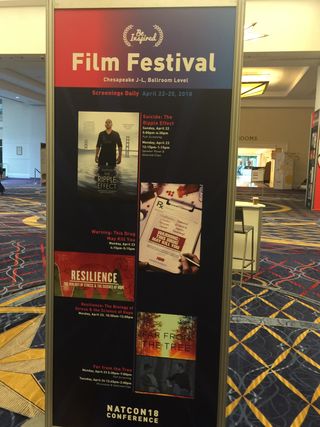Health
A Short Review of 8 Behavioral Health Documentaries
8 films that make a difference.
Posted April 26, 2018 Reviewed by Kaja Perina

I just watched 8 films, two of them twice, in 2-1/2 days. No, I was not on holiday or binge watching at home. I had the privilege of hosting the film festival at the 18th annual meeting, outside DC, of The National Council on Behavioral Health (NATCON18). Between 100 and 200 attendees came to all the screenings, regularly overflowing the room.
The films we selected to show were all documentaries but one, which was from a true story:
- Far From The Tree
- Suicide: The Ripple Effect
- Warning: This Drug May Kill You
- The Glass Castle
- Resilience: The Biology of Stress & the Science of Hope
- 32 Pills: My Sister’s Suicide
- Heroin(e)
- Beyond The Silence

Far From The Tree (93 minutes) - My favorite. One of the most beautiful films I have seen in years. Drawn from Andrew Solomon's masterpiece of a book with the same title, Rachel Dretzin and Dr. Solomon chose a selection of the families portrayed in the book. Produced by Participant Media, a film company with a conscience, FFTT premiered in the fall of 2017, when I reviewed it. There were palpable feelings in the room for the people in this extraordinary film about differences (children born very different from their families) and how identity can emerge and transform all involved.
Suicide: The Ripple Effect (77 minutes) – In 2000, Kevin Hines jumped off the Golden Gate Bridge. Of the over 1600 suicidally intended jumpers, he has been the only one to survive. A gripping story where grit, hope and support, we meet and follow Mr. Hines as he rebuilds a life and becomes a world-wide suicide prevention advocate. Mr. Hines, his co-director and the film’s multiple Oscar-winning cinematographer were there, lending passion and example to our experience of the film.
Warning: This Drug May Kill You (60 minutes) - this 2017 HBO documentary by Perri Peltz has us crisscross the country and meet white, middle American families (where the opioid epidemic has now spread) that have lost a child, parent or other family member to an opioid overdose. (See my HuffPost review.) A warning, as you can imagine, there are few stories as rough as when a child dies, and in these instances a potentially preventable death. Ms. Peltz educates us about the opioid epidemic, brings great compassion to her encounters with these families, and leaves us with a message that it is time to curtail this epidemic, which can be done - though with strategies different from criminalization and blaming people with a substance use disorder.
The Glass Castle (127 minutes) - This was the only major studio film we screened (if you don't count HBO and Netflix), and the only one with A-list actors (Woody Harrelson, Brie Larson and Naomi Watts). It also is drawn from a book, Jeanette Walls’ autobiography with the same title. She emotionally survived the chaos and recklessness of her parents (and grandparents), and became a writer. The film is stunningly shot and amazingly acted, and we had panelists speak who were raised in similar families. Some in the audience, during discussion, did wonder how all four children could have achieved adult lives as free of the residua of trauma as was depicted in the film.
Resilience: The Biology of Stress & the Science of Hope (90 minutes) - Persistent stress mobilizes our adrenergic nervous system (fight or flight) and produces a steady stream of cortisol, which over time does damage to the heart, brain, pancreas, and lots more you don't want. Brain and body stress induces chronic inflammation, which has been highly associated with a host of diseases including diabetes, heart disease, Alzheimer's, depression, PTSD, even schizophrenia. This film clearly shows us how that happens, focusing on ACEs (Adverse Childhood Experiences) and the inspiring work of Dr. Nadine Burke Harris. This is a primer of the highest quality.
32 Pills: My Sister’s Suicide (84 Minutes, HBO) - Told with utter candor and pathos, a married, mother of 2 young children, shows us the life of her older sister, who takes her life at the age of 22. Ruthie, the older, is diagnosed with bipolar, maybe borderline, disorder and lives a life of turbulence fitting for both conditions. Hope, our guide to her sister, takes us on a gorgeous and tortured path revealing her adored, and now dead, sister especially through her abundant art - photos small and large, drawings, paintings, tiny sculptures from everyday materials - and the haunting prose of her journals. Hope is also on her own journey through grief, and wracking guilt. We leave Hope as the film concludes with her surfacing after all so many years. We can feel her shaky confidence, and want to wish her Godspeed.
Heroin(e) (39 minutes) - This fast-paced, Netflix produced, short documentary features three women: a firefighter and nurse, a Drug Court Judge, and a mobile minister in her car. The future of our country needs to be in the hands of women like these. Shot in a town in West Virginia, where among the greatest rate of ODs in the country resides, we understand what drives everyday people to addiction, and meet those dedicated to keeping them alive. The film also strongly advocates for Naloxone (Narcan), the lifesaving antidote to opioid-induced respiratory arrest. I carry 2 spray vials of Naloxone in my briefcase. Worth bringing this film to a town or community meeting.
Beyond The Silence (95 minutes) - This film appears to be a bit of a crime thriller. But it is really about serious mental illness and the criminal justice system. A man in a severely psychotic state murders his mother. Set in New Jersey, he comes to trial and is found guilty. But with treatment, which he finally takes in lock-up and often did not when he lived with his wife and son before his crime, he improves substantially and is working his way, step by step, out of prison. People with serious mental illnesses can be violent, but the most effective way to prevent that is by early and continuous, community-based treatment.
I love going to the movies. This was a lot of movie-going in a relatively short time, but the large screen, good sound, and especially the company of others made the time disappear.
I offer this list, with short annotations, imagining some of the films may pique your interest and offer you the pleasure of going to the movies.
- Dr. Lloyd Sederer is a psychiatrist and public health doctor. The opinions offered here are entirely his own.
- His next book, The Addiction Solution: Treating Our Dependence on Opioids and Other Drugs, will be published by Scribner (Simon & Schuster) on May 8, 2018.
- You can follow him on Twitter @askdrlloyd - and thru his website www.askdrlloyd.com




